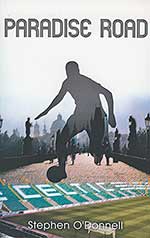 by Stephen O’Donnell
by Stephen O’Donnell
Ringwood, £9.99
Reviewed by Mark Poole
From WSC 325 March 2014
Football fiction generally has a bad reputation, which makes Paradise Road a moderately pleasant surprise. It’s competently written, with likeable characters and an enjoyable plot. It’s told from a range of perspectives but the loose storyline concentrates on Kevin McGarry, a Celtic fan dealing with the premature end of his own playing career and consequently seeking fulfilment following his team, socialising with his friends and family and working as a joiner for the council. The story provides an experience of life in the thick of the Celtic v Rangers rivalry, takes an occasional detour from Scotland to Prague and includes enjoyable chapters where McGarry fantasises about the details of his football career that got away.
It’s set in the late 1990s, when Celtic were fielding popular, relatively talented players, from John Collins to Jorge Cadete. The team were playing well but still, somehow, losing almost every major trophy to Rangers. It’s fertile ground for Celtic nostalgia, safe in the retrospective knowledge that the good times would soon be back.
The story is told with sharp humour that can make a fan throwing his beer can at an obnoxious policeman’s innocent horse seem funny while the interaction between the central character and his friends and family is engaging. As always with football fiction, there is a difficult balance to strike between telling a story and pontificating about issues affecting the game. Once or twice Paradise Road feels close to a lecture on subjects that will perhaps be too familiar to most of its readers. No matter how much you agree that Celtic and Rangers are not simply two sides of the same coin, or that Scotland’s national anthem, Flower of Scotland, is as potentially offensive as any Celtic songs, it’s still likely to be hard work to read about in anything but the most concise way. This is a shame because the book flows so well in other places that’s it’s clear the author is no boring obsessive.
Among the interesting topics it deals with is an honest appraisal of how thrashing Aberdeen, who had dominated Scottish football so recently, becomes much less satisfying in an era when contrasting incomes leave the clubs mismatched. And it provides a subtly impassioned reminder of how much more enjoyable the matchday experience was before the gentrification of football. It’s an argument that’s been heard frequently elsewhere, but fiction provides an excellent context for the value of one fan’s perspective. The book will appeal to many Celtic fans, while some of the more universal topics may make it of interest to fans of other clubs, particularly outside Scotland.